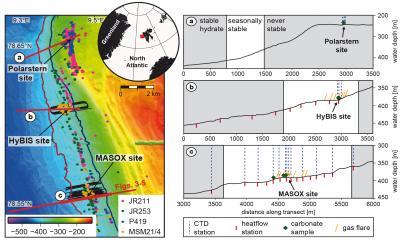Methane hydrates are ice-like solid fuel composed of water and methane. And they are fragile. In some areas, such as in the North Atlantic off the coast of Svalbard, scientists have detected gas flares regularly and the reasons for their occurrence were unclear. They seem to only be stable at high pressure and low temperature.
If so, global warming might cause the dissolution of gas hydrates, according to an analysis led by scientists from GEOMAR Helmholtz Centre for Ocean Research Kiel who say that it is very likely that methane hydrate gas flares are caused by natural processes.
"In 2008, when we observed the outgassing of methane for the first time, we were alarmed," reports Professor Christian Berndt, lead author of the study from GEOMAR. "The gas originates from depths where the hydrates should normally be stable. But we knew that a relatively small warming might melt the hydrates", Berndt explains. Thus, the key question was to find out what causes the outgassing. Step by step, several expeditions that took place in the following years helped to solve the mystery.

Carbonate crusts at the observing site HYBIS at 385 meters water depth. For comparison: the white organisms in the right part of the picture have a length of about 15 cm. Carbonates of this size require several 100 years to build-up. Credit: GEOMAR
One of the most obvious assumptions was that the increasing global warming has already extended into these regions of the North Atlantic. However, the investigations partly carried out with the German research submersible JAGO, pointed clearly to natural causes.
Instead, they found that the seasonal variations in temperature in this region are sufficient to push the stability zone of gas hydrates more than a kilometer up and down the slope.
"Additionally, we discovered carbonate structures in the vicinity of methane seeps at the seafloor," added Dr. Tom Feseker from MARUM. "These are clear indicators that the outgassing likely takes place over very long time periods, presumably for several thousand years."

Area of investigations west of Svalbard are shown. During several expeditions observations were performed. The colored dots mark gas seeps, the three named sites mark locations where dives took place. Credit: GEOMAR
Over long periods of time the deep ocean will also warm up and in particular the polar regions are affected. Here, enormous amounts of methane hydrate are stored in the ocean floor. "As a powerful greenhouse gas methane represents a particular risk for our climate. A release of large amounts of the gas would further accelerate global warming," says Berndt. "Therefore, it is necessary to continue long-term monitoring, particularly in such critical regions as off Svalbard."





Comments